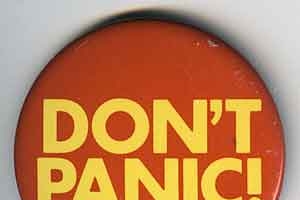Overcome Fear of the Dark
5 illuminating tips to help you relax when the light goes out
 Fear of the dark is usually caused by a misuse of the imagination, which can be helped with self hypnosis.
Fear of the dark is usually caused by a misuse of the imagination, which can be helped with self hypnosis."It's 'nyctophobia'. I feel embarrassed to admit it! I'm twenty-eight. It's normally kids that have it. I manage eight people at work. I shouldn't have this phobia, but I have. Can you help me?"
Janet obviously presumed I knew what 'nyctophobia' was. My first instinct was to nod wisely and bluff. Instead, I frantically ransacked my memory. Nyctophobia... fear of... fear of nicotine. No! "It's normally kids that have it." That was a clue. Ah, could it be? Jackpot!
She looked at me, assuming perhaps from TV drama therapy that it was a therapist's role to sit impassively for thirty seconds with a pained expression on his face.
"Fear of the dark!" I blurted out triumphantly.
"Err...yes. I sleep with the light on in my bedroom. Not just the main light, but my bedside lamp too. I even have the landing light on. My eight-year-old son is beginning to ask me why I can't sleep without lights on. I'm terrified of passing on this fear to him."
Fear of the dark: An ancient legacy?
Fear of the dark often, but not always, begins in childhood. Yet in historical cave-dwelling, beast-avoiding times, being fearful - or at least respectful - of the dark would have had survival advantages. Of course, hopefully you sleep in a secure environment. If you don't, then you need a certain fear of darkness until such times as your sleeping place does become more secure.
Nothing to fear but fear itself
Janet's older sister (now a famous novelist) had spent years telling her younger sister ghost stories as they drifted off to sleep in their shared room. Some were so scary that Janet's imagination went into hyper-drive and from that point on, she'd found sleeping with the lights off virtually impossible.
"Nothing is as frightening as your own imagination!" Janet knew the power of her own mind to create horrifying and vivid scenarios.
Now I did nod wisely.
"It's not that I fear anything specific like a prowler or ghosts. It's just a creeping sense of pervading menace. Can you help me?"
She was forthright, confident. I could see how she managed eight people at work. I felt like it was me being managed.
"Yes! But along with me helping, you are going to help yourself, too. Agreed?"
We began.
Removing the pain from times past
Fear of the dark needs to be treated as a phobia. I asked Janet if she had specific scary memories. She did, so I used the rewind technique to 'de-condition ' those memories. If your fear of the dark amounts to an intense phobia, perhaps because of specific traumatic memories which occurred in the dark, I suggest you seek the help of someone skilled in the use of this technique.
But there are other useful tips that may serve equally well in lifting the fear. So without further ado:
1) Wean yourself from light
What we avoid we tend to fear and what we embrace we come to love (or at least get to feel okay with). Janet also reported feeling tired a lot of the time; the fact is, the darker our sleeping quarters (to sound a bit Victorian), the deeper we sleep and the more rested we feel in the morning (1).
Even dim light can prevent us going as deeply into sleep and disrupt our proper rest. I suggested Janet sleep the first three nights with the hall light turned off. When she felt comfortable about that, she was to turn the bedside light off. She'd been awakening early at 6.00 am - an hour before she needed to rise - so I suggested she switch off the main light at this time. The last hour in bed was thus spent with all lights off. Gradually, we reduced her light and she instantly reported better quality sleep as she began to sleep in a darker environment.
Take it step by step. Remove or dim light sources little by little and remember you'll be doing your brain and body a massive favour by giving them a better chance for deep rest.
2) Relax deeply during the day and program yourself to relax in the dark
Janet had rightly said, "Nothing is as frightening as your own imagination!" And she was right; but nothing is as good at getting over fear as the constructive use of your imagination, sometimes known as hypnosis. I got Janet to listen to a hypnosis session I'd recorded. She listened around 5.00pm (as her son was finishing his homework) and, as a result, started to feel naturally calmer about the prospect of having the light off.
3) Challenge the fear
Fear of the dark isn't just being scared of the absence of light, of course. Thoughts as to "what's out there!" may menace the mind of the sufferer. Often the back of the chair or closet door becomes transfigured by darkness and imagination into a more menacing shape.
Think about what specifically scares you and actively challenge those thoughts. For example, if you fear something may happen to you, tell yourself: "Okay, what are the chances of something happening ?"
"But it might!"
"Yes, but what are the chances ?"
In an emergency, you'll wake up very quickly, even from deep sleep; so you might as well drift off.
4) Overcome fear of the dark by controlling your body
Imagination may stimulate fear, but your body needs to collude with the fancies of your mind for fear to actually develop. When you become fearful in the night, you may:
- Stop breathing and moving for a few seconds. We do this if we fear we are being watched, as obviously not breathing or moving makes us less detectable to predators.
- When we do start breathing again, we tend to breathe rapidly in shallow gasps.
Gasps are inhalations. Sighs are exhalations. My advice on controlling your body's fear response? Sigh; don't gasp. Breathing in (without much breathing out) stimulates your heart to beat faster and wakes you up. Breathing out longer than you breathe in slows everything down...quite useful if you need to relax and sleep.
So keep breathing (fantastic advice for anybody); but if you feel a little fearful, make a conscious effort to breathe out more slowly than you breathe in (no matter what tricks your imagination is up to). You might count in your mind: 7 counts on the in-breath and 11 on the out. Doing this will help you relax quickly and powerfully.
5) Reframe your idea of 'darkness '
Janet had always feared the dark. Even the word 'dark ' sent shivers down her spine. As she began to relax with the lights off, she developed a new frame of reference for what darkness meant for her:
"Now when I think about the dark, it feels like a friend, no longer the prowling enemy. It feels cozy; a wonderful velvety blanket of comforting rest time in which it doesn't matter what I look like, what others think. A time into which I can escape and relish deep privacy. Anyway, in my mind, when I dream, I see perfectly clearly."
Write down or just reflect in your mind how you'd like to think and feel about 'the dark'. Maybe you'll be as poetic as Janet was.
I said that darkness was naturally feared in times past; but being in the dark also helps humans everywhere enjoy deep sleep, the recuperative organ and muscle rest essential to living effectively and enjoying the daytimes all the more.
Before she left for the last time, Janet smiled. "You did help me help myself! But tell me, honestly. You had no idea what nyctophobia was when I first mentioned it, did you!"
Janet was a smart woman.
References
- Melatonin is a hormone that regulates our sleep-wake cycles, triggering desire to sleep and determining the depth of sleep we achieve. The intensity of light to which we're exposed at any given moment is what tells the pineal gland in our brain whether or not to produce melatonin. Darkness stimulates melatonin production while light inhibits it. Thus, the darker it is when you sleep, the better your melatonin production and the better your sleep quality. Even dim light from a night light or hall light can disrupt sleep cycles and prevent you from getting deep sleep.






